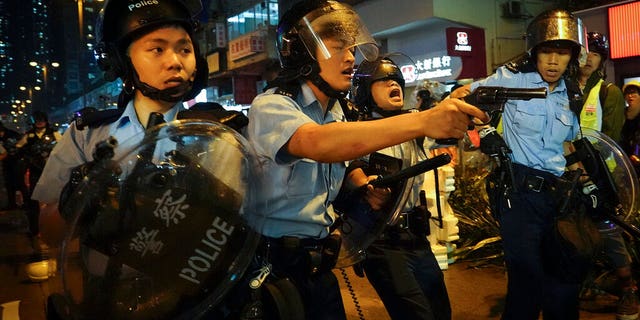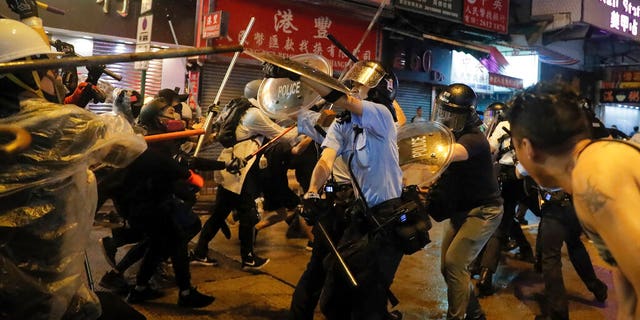BIARRITZ, France — President Trump shifted tone on his trade war with China yet again on Monday, expressing confidence that the two sides can reach a deal and calling President Xi Jinping a “great leader” three days after branding him an “enemy.”
As he completed an international summit meeting, Mr. Trump told reporters that Chinese officials had reached out by telephone and that negotiators would restart trade talks after the latest escalation in tariffs and his “order” to American companies to look for ways to pull out of China.
In another surprise, Mr. Trump also said he was open to meeting with President Hassan Rouhani of Iran within the next few weeks in response to an initiative by President Emmanuel Macron of France. If such a meeting came about, it would be the first between American and Iranian leaders since the Tehran hostage crisis of 1979-81.
[See the latest updates on the Group of 7 meetings in France.]
Mr. Trump, who since taking office has abandoned the 2015 nuclear agreement with Iran and reimposed sanctions to cripple its economy, even said that if talks begin, he would be willing to back short-term loans to Iran secured by oil to help Tehran get through its current financial troubles.
The change in the president’s language about China was striking given the wild fluctuations in his approach over the last few days, and it seemed to reassure markets rattled by the latest escalation of tariffs on Friday. But it was not clear how concrete an opening China really had made.
“We were called and we’re going to start very shortly to negotiate,” Mr. Trump said. “We’ll see what happens, but I think we’re going to make a deal.” He added that the Chinese seemed ready to agree. “This is the first time I’ve seen them where they really want to make a deal.”

Although Mr. Trump originally said the American side had received two phone calls, Beijing did not immediately confirm any, and the editor of a newspaper owned by the Chinese Communist Party wrote on Twitter that there had been no significant contacts in recent days.
Asked later about that, Mr. Trump gave no details but insisted that in fact there had been “numerous calls” in the previous 48 hours.
Either way, Mr. Trump appeared to be trying to tamp down the conflict shortly before markets reopened for the week and investors responded on Wall Street, where prices rose in early trading. Mr. Trump cited a public appeal for calm by China’s chief negotiator, Liu He, taking it as a signal that Beijing wanted to de-escalate.
“We are willing to resolve the issue through consultations and cooperation in a calm attitude and resolutely oppose the escalation of the trade war,” Mr. Liu, a Chinese vice premier, said in a speech that got the president’s notice. “We believe that the escalation of the trade war is not beneficial for China, the United States nor to the interests of the people of the world.”
On the one hand, Mr. Liu’s comments were simply a restatement of longstanding Chinese policy and China’s state media did not initially give them much attention. But coming after days of volatile and combative statements and actions, Mr. Trump invested great meaning in the comments.
Mr. Trump has pivoted repeatedly in his language on the conflict in recent days. On Friday, after China imposed new tariffs in retaliation for American levies, Mr. Trump said he “hereby ordered” American companies to start leaving China and vowed to increase his own tariffs. He referred to Mr. Xi as an “enemy.”
On Sunday, Mr. Trump said he’d had “second thoughts” about the escalation. But within hours, aides rushed out statements saying that his only regret was that he had not been even tougher on China.
The developments with Iran took many by surprise. Mr. Macron, who has tried to preserve the 2015 nuclear agreement that Mr. Trump has abandoned, stunned many by issuing a last-minute invitation to Iran’s foreign minister, Mohammad Javad Zarif, to visit Biarritz and talk on the sidelines of the Group of 7 meetings on Sunday.
He took that further on Monday by saying he had spoken with Mr. Rouhani and was confident that if Mr. Trump met with him, the two could find a potential deal on Iran’s nuclear ambitions and what the Americans and their allies consider Iran’s destabilizing activities in the Middle East.
Joining Mr. Macron at a news conference at the end of the Group of 7 sessions, Mr. Trump expressed openness to a meeting with Mr. Rouhani without eagerly embracing it. “If the circumstances were correct or right, I would certainly agree to that,” the president said. “But in the meantime, they have to be good players. You understand what that means.”
He said that Iran can be a “great nation” and that he does not seek regime change but if Iranian leaders pursue their aims at the expense of America’s national interests, “they’re going to be met with really violent force.”
But Mr. Trump, who has repeatedly castigated former President Barack Obama for unfreezing billions of dollars of Iran’s money as part of the nuclear deal, said he would go along with “a short-term line of credit or loan” to Iran secured by oil. “We’re talking about a letter of credit,” he said. “It would be from numerous countries.”
No American and Iranian leaders have met since the 444-day hostage crisis that broke relations between the two countries and hobbled Jimmy Carter’s presidency. Mr. Obama talked by telephone with Mr. Rouhani in 2013 but the Iranian leader declined at that time to meet in person amid pressure from hard-liners in his own country.
“This is what I mentioned to President Rouhani on the phone as well — that if he agreed to a meeting with President Trump, that my conviction was that an agreement can be met,” Mr. Macron said. “I hope that in the next few weeks based on our discussions we will be able to achieve the meeting.”
The prospects for such a meeting are unclear. Mr. Rouhani and Mr. Zarif are answerable to Iran’s supreme leader, Ayatollah Ali Khamenei, who has said repeatedly there can be no negotiations with the Trump administration.
Mr. Trump said Mr. Macron had asked if he had any objection before Mr. Zarif’s visit and that he did not. But he said he had declined to meet with Mr. Zarif while he was in town. “I spoke to President Macron yesterday, and I knew everything he was doing,” he said. “And I approve whatever he was doing. And I thought it was fine.”
But he said he had chosen not to see Mr. Zarif, who became the target of sanctions by the Trump administration last month. “I think it’s too soon to meet, I didn’t want to meet,” Mr. Trump said. “But it’s true there’ll be time to meet with Iran, and it’s going to be a great thing for Iran. They have a great potential.”
As the Group of 7 meeting ended, Mr. Trump emphasized that he got along well with fellow leaders a year after storming out of the group’s meeting in Canada with harsh criticism of its host, Prime Minister Justin Trudeau, and without signing the joint communiqué.
But even as leaders stuck to polite tones, their differences were evident. Mr. Trump skipped a session on climate change and the oceans after aides privately complained that Mr. Macron, as the summit host, was too focused on “niche issues.”
Stephanie Grisham, the White House press secretary, said Mr. Trump missed the climate session because he had other meetings. At the session he skipped, the remaining leaders agreed on a $20 million aid package to help Brazil and its neighbors fight the fires raging in the Amazon rainforest.
Mr. Macron and President Sebastián Piñera of Chile said they also had reached an agreement in principle with countries of the Amazon basin for a long-term program of forest protection and reforestation of cleared lands. They said more details might be presented next month at the United Nations General Assembly.
On other issues, Mr. Trump found his attention rebuffed. Prime Minister Narendra Modi of India, attending as a guest, declined Mr. Trump’s offer to mediate the escalating dispute with Pakistan over the territory of Kashmir.
“These issues are bilateral,” Mr. Modi said as he sat with Mr. Trump for a meeting on the sidelines of the main events.
Mr. Modi’s government this month terminated the autonomy of the part of Kashmir controlled by India, and temporarily severed most communications to the impoverished region in the Himalayas, long been claimed by both India and Pakistan. Indian forces rounded up more than 2,000 Kashmiris in a crackdown in the days before and after the move, local officials have told The New York Times.
Speaking with reporters, Mr. Trump offered no criticism of India’s action and deferred to Mr. Modi’s preference that the United States keep out of the matter. “The prime minister really feels he has it under control,” Mr. Trump said.
Prime Minister Imran Khan of Pakistan told The Times last week that Mr. Modi and his government had rebuffed all entreaties to talk. “There is no point in talking to them,” Mr. Khan said. “I mean, I have done all the talking.”
https://www.nytimes.com/2019/08/26/world/europe/g7-trump-china-trade-war.html
2019-08-26 17:14:00Z
52780361645538




